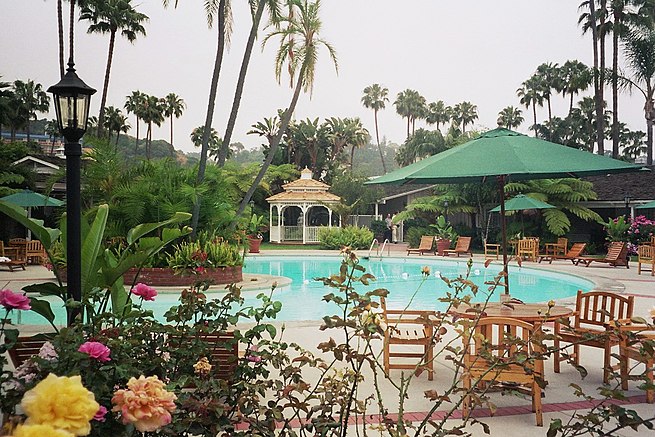
Main Difference
The main difference between Hotel and Resort is that the Hotel is a establishment that provides lodging paid on a short-term basis and Resort is a self-contained commercial establishment which attempts to provide for most of a vacationer’s wants
-
Hotel
A hotel is an establishment that provides paid lodging on a short-term basis. Facilities provided may range from a modest-quality mattress in a small room to large suites with bigger, higher-quality beds, a dresser, a refrigerator and other kitchen facilities, upholstered chairs, a flat screen television, and en-suite bathrooms. Small, lower-priced hotels may offer only the most basic guest services and facilities. Larger, higher-priced hotels may provide additional guest facilities such as a swimming pool, business centre (with computers, printers, and other office equipment), childcare, conference and event facilities, tennis or basketball courts, gymnasium, restaurants, day spa, and social function services. Hotel rooms are usually numbered (or named in some smaller hotels and B&Bs) to allow guests to identify their room. Some boutique, high-end hotels have custom decorated rooms. Some hotels offer meals as part of a room and board arrangement. In the United Kingdom, a hotel is required by law to serve food and drinks to all guests within certain stated hours. In Japan, capsule hotels provide a tiny room suitable only for sleeping and shared bathroom facilities.
The precursor to the modern hotel was the inn of medieval Europe. For a period of about 200 years from the mid-17th century, coaching inns served as a place for lodging for coach travelers. Inns began to cater to richer clients in the mid-18th century. One of the first hotels in a modern sense was opened in Exeter in 1768. Hotels proliferated throughout Western Europe and North America in the early 19th century, and luxury hotels began to spring up in the later part of the 19th century.
Hotel operations vary in size, function, complexity, and cost. Most hotels and major hospitality companies have set industry standards to classify hotel types. An upscale full-service hotel facility offers luxury amenities, full service accommodations, an on-site restaurant, and the highest level of personalized service, such as a concierge, room service, and clothes pressing staff. Full service hotels often contain upscale full-service facilities with a large number of full service accommodations, an on-site full service restaurant, and a variety of on-site amenities. Boutique hotels are smaller independent, non-branded hotels that often contain upscale facilities. Small to medium-sized hotel establishments offer a limited amount of on-site amenities. Economy hotels are small to medium-sized hotel establishments that offer basic accommodations with little to no services. Extended stay hotels are small to medium-sized hotels that offer longer-term full service accommodations compared to a traditional hotel.
Timeshare and destination clubs are a form of property ownership involving ownership of an individual unit of accommodation for seasonal usage. A motel is a small-sized low-rise lodging with direct access to individual rooms from the car park. Boutique hotels are typically hotels with a unique environment or intimate setting. A number of hotels have entered the public consciousness through popular culture, such as the Ritz Hotel in London. Some hotels are built specifically as a destination in itself, for example at casinos and holiday resorts.
Most hotel establishments are run by a General Manager who serves as the head executive (often referred to as the “Hotel Manager”), department heads who oversee various departments within a hotel (e.g., food service), middle managers, administrative staff, and line-level supervisors. The organizational chart and volume of job positions and hierarchy varies by hotel size, function and class, and is often determined by hotel ownership and managing companies.
-
Resort
A resort (North American English) is a self-contained commercial establishment that tries to provide most of a vacationer’s wants, such as food, drink, lodging, sports, entertainment, and shopping, on the premises. The term resort may be used for a hotel property that provides an array of amenities, typically including entertainment and recreational activities. A hotel is frequently a central feature of a resort, such as the Grand Hotel at Mackinac Island, Michigan. Some resorts are also condominium complexes that are timeshares or owed fractionally or wholly owned condominium. A resort is not always a commercial establishment operated by a single company, but in the late 20th century, that sort of facility became more common.
In British English “resort” means a town which people visit for holidays and days out which usually contains hotels at which such holidaymakers stay. Examples would include Blackpool and Brighton.
-
Hotel (noun)
A large town house or mansion; a grand private residence, especially in France. from 17th c.
-
Hotel (noun)
An establishment that provides accommodation and other services for paying guests; normally larger than a guesthouse, and often one of a chain. from 17th c.
-
Hotel (noun)
The letter H in the ICAO spelling alphabet. from 20th c.
-
Hotel (noun)
The larger red property in the game of Monopoly, in contradistinction to houses.
-
Hotel (noun)
The guest accommodation and dining section of a cruise ship.
-
Resort (noun)
A place where people go for facilities such as lodgings, entertainment, and a relaxing environment.
-
Resort (noun)
Recourse, refuge something or someone turned to for safety.
“to have resort to violence”
-
Resort (noun)
A place where one goes habitually; a haunt.
-
Resort (noun)
An act of sorting again.
-
Resort (noun)
Active power or movement; spring.
-
Resort (verb)
To have recourse (to), now especially from necessity or frustration.
-
Resort (verb)
To fall back; to revert.
-
Resort (verb)
To make one’s way, go (to).
-
Resort (verb)
To repeat a sorting process; sort again.
